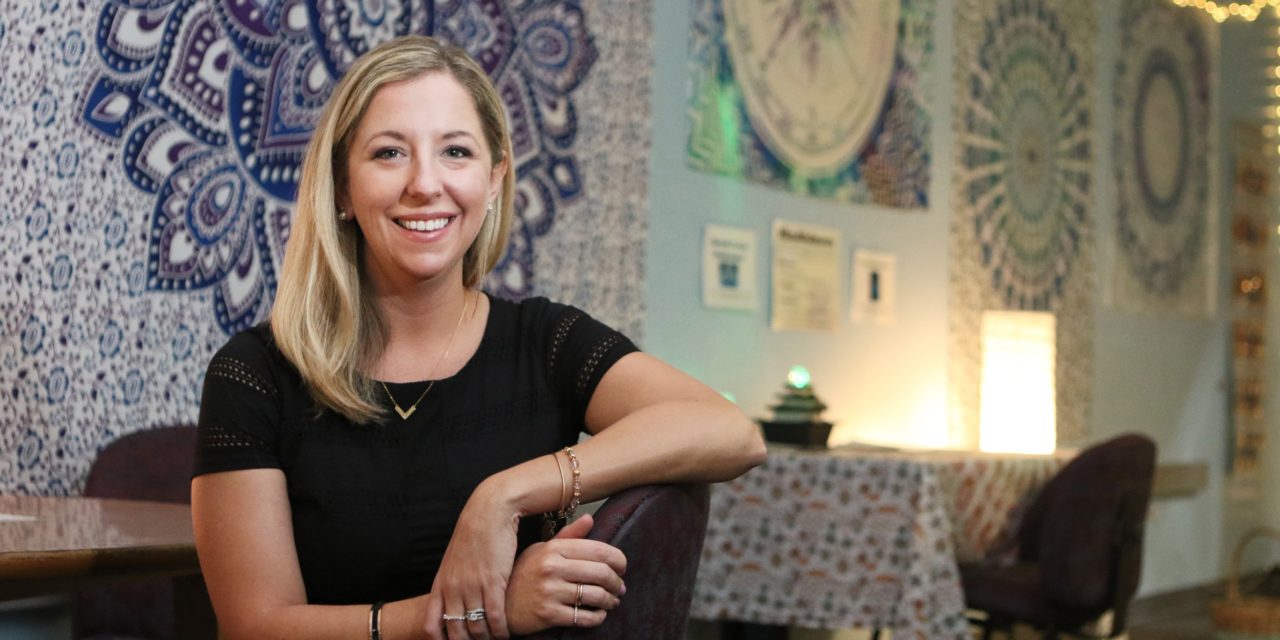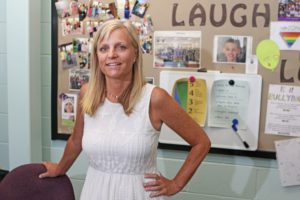by Lisa Moody Breslin, photography by Bill Ryan
When the doors open for the school year at Oklahoma Road Middle School, Beth Prestianni will begin her 23rd year as a school counselor, 15 of those years at Oklahoma Road.
This year, Kristen Cavey steps into her third year as a counselor at Winters Mill High School; nine years before her counseling days, she enjoyed teaching at the elementary school level.
Both women share a passion for a career that has changed drastically over the years as students’ needs have become more complex. What was once a profession that focused on helping students navigate their own career path is now a more holistic venture.
Today, national standards call for counselors to focus on three core domains in students’ lives: academic, career, personal/social. Today, most school counselors would probably confirm that they spend most of their time helping students untangle personal/social concerns.
Today, school counselors are more involved in crisis intervention. They are armed with information about trauma and how it affects the brain, specifically how students learn. They are keenly aware of how poverty affects students. And they are mediators who often counsel parents in order to better reach their sons, daughters and gender-fluid family members.
The seasoned school counselor, Prestianni, and the relative newbie, Cavey, offer unique perspectives about what is like to mentor students today.
Prestianni and Cavey’s passion for this challenging profession is contagious. At first, Cavey was reluctant to be interviewed, but because of her love for counseling and for the chance to help others in a field that is so critical to student success, she called to say, “I’m in.”
Here are some of their thoughts about what it’s like to help students find their own compass for unexplored, often turbulent terrain.
Perceptions Vs. Reality
Prestianni: We are still working on changing perceptions about what a counselor does. Many people still see us in the academic counselor role, helping students focus on college readiness and their careers. But our job is so much more than that. We are not just helping students with their schedules. We are a resource for so many other needs; we connect students to resources and people too.
That Was Then, This Is Now
Prestianni: Over the last five to ten years, it has been challenging to wrap my head around students’ lives. The expectations of them, the academic rigor, competition has increased, safety needs have changed. It’s a lot.
Technology sparked the biggest change. When I started 22 years ago, email was just starting and I had my first student come in concerned about a post on MySpace. My first thought was “What is MySpace?” Now problems linked to social media are a weekly occurrence. Instagram, Snapchat posts. We have intervention programs and programs about cyber bullying and cyber safety – programs that were never needed before.
Diversity – ensuring that everyone welcomes diversity – is another focus. Over the last two or three years I’ve gone to gender conferences to increase my knowledge. This year is the first year we offered an information session for students who had concerns or wanted to support the LGBT community.
Cavey: My caseload is between 250 and 300 students and still I take pride in developing a rapport with them. We meet to talk about their goals and I do anything I can to expose them to real world experiences that will help them meet those goals.
I also enjoy talking with them in the hallways, anywhere we can find the time. I’ll often hear “Hey, Miss Katie” throughout the day.
Ventures or Programs You Have Piloted that you are proud of?
Prestianni: A few years ago, school counselors were test coordinators at the middle school level. We collected data and information about the impact of test coordination on our role as counselors. We knew there were budget constraints, but the data revealed the negative impact of our time being spent coordinating and managing tests. Assistant principals are now the coordinators; we are involved but we are not leading the efforts.
Cavey: Last summer Judy Klinger led an in-service day for all counselors and introduced us to ACES. It resonated with me so I immersed myself in all kinds of research. With administrative support, I’ve been able to help the Winters Mill community understand how adverse childhood experiences – losing a parent or a home – even disruptions like divorce, deployment – affect how students learn. To help students cope, Winters Mill will be introducing different strategies, various ways to pause, to breathe before reacting to something stressful. For example, before tests, students will take three minutes to center themselves. We will have a Mindfulness Room. The initiative is a little scary. I’m so proud of the staff for being willing to try.
A wish for all students
Prestianni: Resiliency. Students are going to get hit with difficult situations, even failure. They have to be able to bounce back. That is huge. Rather than getting sucked under or stuck, they need to recover. Some students have that naturally; others do not. I try to assure them that nothing is ever permanent, that one way to recover is to just try and do their best in the moment they are in. If they feel like they can improve, then set goals and make changes. And I assure them that they have to have hope. They have to be optimistic that things will work out. There are teachers, counselors, parents, peers to connect with to get you through anything.
Cavey: Take one day at a time and be sure to do something you love each day. At the same time, have a vision for where you want to be in the future and know what you are doing to get there. Sometimes what you are doing is self-care. That’s a very important part of moving forward. Ideally, students are resilient, driven, self-aware.
A wish for parents
Prestianni: As parent I struggle with this, but I would wish that all parents can find the right balance between offering structure and offering freedom – between laying down the hammer and backing off.
Cavey: Ideally, parents are self-aware, understanding and accepting.
For the love of their professions
Prestianni: I love the connection with the students most. There is an indescribable energy in their love for life. Every day is different. I could have gone into private practice, but I worried that I would only see people in crisis. As a school counselor, I get to experience a range of needs, from students in crisis to students who grow as leaders.
Cavey: The most rewarding part of my job is knowing that every day I get to make a difference. I can be the person who makes students feel better, reach a goal or solve a problem. It’s a blessing to be able to help people through some of the roughest times of their lives – to be able to be the person that parents let their children lean on.


